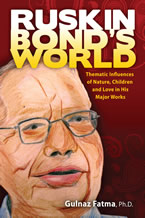Article first published as Book Review: ‘Ruskin Bond’s World’ by Gulnaz Fatma on Blogcritics.
November 12, 2013
Ruskin Bond’s World:
Thematic Influences of Nature, Children, and Love in His Major Works
Gulnaz Fatma, Ph.D.
Modern History Press (2013)
ISBN: 978-1-61599-199-0 (paper)
ISBN: 978-1-61599-200-3 (ebook)
New Book Explores Themes and Life of World Famous Indian Author
 Gulnaz Fatma’s Ruskin Bond’s World is a long overdue look at one of the world’s most prolific and enduring authors. In this short book, Fatma covers a great deal of ground, including giving the reader a look into Ruskin Bond’s childhood and early years and how it influenced many of the themes in his writing, from depictions of grandparents and animals to marriage and love.
Gulnaz Fatma’s Ruskin Bond’s World is a long overdue look at one of the world’s most prolific and enduring authors. In this short book, Fatma covers a great deal of ground, including giving the reader a look into Ruskin Bond’s childhood and early years and how it influenced many of the themes in his writing, from depictions of grandparents and animals to marriage and love.
These biographical details interested me the most since I had only read a couple of Bond’s stories previously. I found, however, that Bond and I are kindred spirits. In the unhappiness of his childhood—his mother left his father to marry another man, and then his father died, so Bond went to live with his mother and stepfather—he found his solace in books until reading became his religion. When he read Dickens’ David Copperfield, he decided he wanted to be an author. (That book had a great influence on me as well in my desire to be an author.) He also became a lover of nature because of his father’s influence, until he preferred spending time in nature rather than with people, and he even saw trees as his friends. Like Bond, who is known as “India’s Wordsworth” for his love of nature, I had a very Wordsworthian childhood so I could identify with many aspects of his childhood and his depictions of children in nature.
Bond has never married but he has known what it is to love and he has been like a grandfather to friends’ children. In fact, he has become India’s great writer of children’s stories, both from a desire to please children and as a way to cope with difficult times in his life and recapture the happy moments of his own childhood. Fatma quotes him as saying, “I don’t suppose I’d have written so much about children or even other children if my own childhood had been all happiness and light. I find that those who have contented, normal childhoods, seldom remember much about them; nor do they have much insight into the world of childhood.”
Reading Ruskin Bond’s World made me want to read all of Bond’s books and have the enhanced, rich experience of exploring for myself all the themes of nature, animals, children, and unrequited love in his work, all themes that Fatma analyzes in great detail through his various novels and stories. Fatma also has had the opportunity to meet and interview Bond, and one of the bonuses of this book is the inclusion of one of these interviews. So not only does she trace his themes, showing us how each theme is similar or different in each work, but she is also able to share Bond’s own explanations for why he writes about many of these themes.
Anyone who is already familiar with Ruskin Bond’s work will appreciate reading this book and expanding his or her understanding of this major author’s work. Anyone who is not a reader of Bond will want to be after reading this book. I also think the book would be an excellent companion piece for any course in the short story or specifically a course in Indian literature. Fatma is also the author of A Short History of the Short Story: Western and Asian Traditions, which traces the short story’s development and its various forms. Ruskin Bond’s World is like an expansion on her brief discussion of Bond’s short stories in that book; it also lends itself to helping students with more detailed analyses of themes within his stories, and it could lead to discussions about similar themes in other works of literature. Also included in this book is a valuable in-depth bibliography of all of Ruskin Bond’s novels, story collections, and other works of criticism on him.
Overall, Ruskin Bond’s World is well worth reading, and I hope in time it will be a building block for greater interest in this wonderful writer, including more full-length treatments of his work and a complete biography.
For more information about Gulnaz Fatma and Ruskin Bond’s World, visit www.ModernHistoryPress.com.
— Tyler R. Tichelaar, Ph.D. and award-winning author of The Gothic Wanderer

